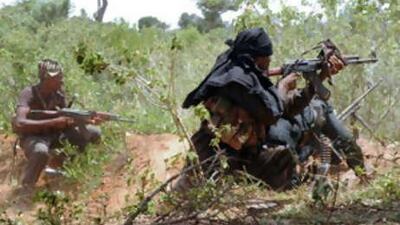COLOMBO // As Sri Lanka slips deeper into the chasm of war, all eyes are now on Kilinochchi, the de facto capital of the Liberation Tigers of Tamil Eelam (LTTE). The Tamil Tigers have spent more than a quarter-century fighting the government of Sri Lanka in an attempt to create a homeland - Tamil Eelam - in the north and east of this tear-shaped Indian Ocean island. The conflict has taken 70,000 lives.
But last year, the Sri Lankan army pushed the Tigers out from the east, and government forces are now making sweeping inroads into rebel-held territory in the Wanni area of northern Sri Lanka, where the rebels operate their own mini-state. They are now said to be barely 6.5km from Kilinochchi. In January, Sri Lanka left a ceasefire brokered by Norway and vowed to crush the Tigers by the end of this year.
Although the government claims it is close to defeating the Tigers, ethnic Tamils - who make up about 18 per cent of the population - are concerned that the government will not stop with the military operation. "This is not a war between the government and the Tigers," said Mr Karunakharan, who spoke under a pseudonym, fearing for his safety. "This is a war between two communities - Tamils and Sinhalese - and unless you resolve the long-standing disputes between them, and the Tamils are given their due rights, peace will remain elusive in Sri Lanka."
Since independence from Britain, Tamils have suffered decades of discrimination by successive Sinhalese governments. The Tigers claim that the only way to progress is for Tamils to have their own independent state. According to a recent survey by the Centre for Policy Alternatives, a Colombo-based think tank, nearly 48 per cent of Sinhalese, who make up more than three-quarters of the population, believe wiping out the Tigers will bring an end to the conflict.
But 83 per cent of Tamils surveyed said the way to end the conflict and attain peace in Sri Lanka was to stop the war and hold negotiations. "How do you negotiate with a guerrilla group that uses suicide bombing as a negotiating tool?" said Udaya Nanayakkata, a government military spokesman. Mr Karunakharan is a resident of Wellawatte, a seaside township in Colombo, often called "Mini Jaffna" because of its Tamil concentration. Jaffna, in the north of Sri Lanka, is considered the cultural heart of the Tamil community but has been controlled by the government since 1998.
The residents of Wellawatte are under suspicion for giving refuge to Tiger rebels that infiltrate Colombo and carry out bombings. For Mr Karunakharan, the LTTE is not a terrorist organisation, but a group that is fighting a "just war" for the rights of Tamils. Mr Karunakharan remembers the riots in 1983, when a rebel ambush of 13 soldiers in Jaffna sparked an anti-Tamil backlash in the capital in which hundreds, possibly thousands, of Tamils were killed by Sinhalese. Now, he fears that if the Tamil Tigers lose Kilinochchi, there will be a lopsided shift in power, leaving no voice for the Tamils, and Sinhalese will have a free hand in treating the Tamils in any manner they choose.
Saying he has been discriminated against at his workplace and often jeered as "Kotiyan" - Koti is Sinhalese for Tiger - Mr Karunakharan fears that the insults will be more open and direct if Kilinochchi falls. "If the LTTE loses Kilinochchi, I will leave Sri Lanka forever and never return to this country," he said. "If they lose this war, Tamils will be treated like slaves in Sri Lanka." The intensifying war only seems to be fuelling suspicion between the two communities. As the Sri Lankan military push ahead in the north, the government fears the LTTE suicide cadres might infiltrate the capital and carry out attacks.
The government has asked Tamils who have come from the north and east of the island in the past five years to register with the local police station. The registration centres have been set up in schools and temples across Colombo and surrounding towns. "In August, 6,950 people have come to the Colombo Police Division and are temporarily living in lodges, houses and various other places. This is not normal," said Gotabhaya Rajapaksa, the defence secretary and brother of Mahinda Rajapaksa, the president. "Among other things it causes a lot of security risks."
Human rights groups claim the government has forcibly begun evicting people from Tamil suburbs in Colombo. According to the United Nations, about 200,000 people are trapped in the Wanni area. UN officials in Sri Lanka say that as fighting intensifies, the displaced are being pushed into Kilinochchi district and other areas where they are at risk. Even though the Tigers have lost vast swathes of their territory over the past year, they still have thousands of hardened fighters and suicide attackers.
Last week, the United Nations and other aid agencies pulled their staff out of the Wanni as the government announced a ban on foreign aid workers from working in Tamil rebel-held areas. Gotabhaya Rajapaksa said the government could no longer guarantee the safety of aid workers in the area. "Without aid workers, those 200,000 people feel abandoned," said Paikiasothy Saravanamuttu, the executive director of the Centre for Policy Alternatives. "Many of the people pleaded with aid workers not to leave. Now there's no one to feel their pain, their agony."
"As houses are destroyed by the increased shelling, people live under very difficult conditions. For many, the sky is their roof, and a piece of sari their wall," said one aid worker who recently left Wanni. The Sri Lankan government is leaving no stone unturned to end this war. It is intensifying army recruitment drives across the island, calling back wounded battle-hardened soldiers, and even re-recruiting deserters and offering them amnesty if they agree to return to the front lines.
* The National

